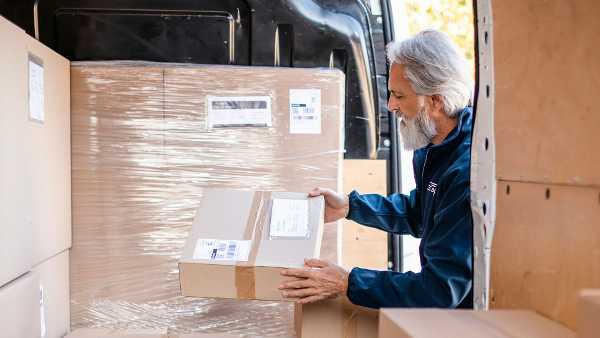Selling items on online platforms
- Gerdine Annaars
- How to
- 5 April 2019
- Edited 12 September 2025
- 5 min
- Starting
You want to sell products through online platforms such as Amazon, Shopify, eBay, Zalando, Marktplaats, Etsy or bol.com. So you sign up to such a platform as a seller, giving you access to millions of buyers. But is it really as simple as it seems? Read here how to get customers through online marketplaces and how things such as terms and conditions, costs, and creating a sales account are arranged.
What do you need to arrange when starting a business?
Answer the questions on Business.gov.nl and see the steps that are important in your situation.
From starter to experienced entrepreneur, you are constantly looking for ways to increase your sales. CBS research (in Dutch) shows that in 2022, almost 9 % of businesses were selling products through an online platform. And 1.5% of these companies only sold via online platforms, so without their own website or app. Do you also want to sell your items via a platform? Then take into account the following:
- Rules
- Platforms and KVK number
- Conditions and costs
- Shop page
- Service standards
- Fulfilment
- Drop shipping
- Trademark registration
- General starter information
Rules
General terms and conditions
There are rules for the transparency of online platforms. That means that platforms and sellers must provide clear information. For example, platforms have to make sure their general terms and conditions are easy for customers to find and read.
There are also rules for sellers on a platform. Be clear about what your company does. Add your company details and make it clear what service you offer. That way, your customer knows who they are doing business with. And remind the customer of the legal cooling-off period. A customer can always cancel a purchase within 14 days of receiving the product.
You must also follow with the rules on delivery. Explain how you deliver the product, always deliver within 30 days, and describe what your customer can do if you do not deliver on time.
Reviews, discounts and more
If you do business with consumers via an online shop, sales platform, or social media, you must follow rules on reviews, discounts, 'free' online services, and comparison sites, among other things.
Safety
If you import and sell products through an online platform, you are responsible for the safety of these items. Avoid bringing unsafe goods onto the market. The platform you sell on can take goods offline and the NVWA (Dutch Food and Consumer Product Safety Authority) can force you to recall the and/or give you a fine.
Sustainability
Since 2024, large companies have to report on how sustainable their supply chain is. This includes online platforms. If you sell your products via an online platform, you may be asked about how and where your products are made.
Platforms and your KVK number
If you want to sell products via for example, Bol.com's partner programme, you have to meet a number of conditions. One is that you are registered at KVK. Sometimes you must be at least 18 years old to open a business account with a sales platform. You do not have to be 18 years old to register with KVK, so pay close attention to the platform's conditions.
Do you want to register with KVK? Then you have to meet conditions. First check these conditions and then fill in the online registration form. You choose your own date, time and place. Bring valid proof of identity to the appointment. Registering with the KVK costs money. You pay with a QR code via your mobile phone. If everything is in order, you will immediately be given your KVK number.
Sometimes a platform will not take your registration into consideration until several weeks (in the case of bol.com, up to 10 weeks) after you have registered with KVK.
Conditions and costs
Selling via a platform costs money. Usually, you pay a monthly fee for a business account on a platform. Sometimes a fee per sale is added. This is usually a percentage of the turnover and can vary per product category. And you may have to pay for extra options. For example, a link with your social media channels, a payment module, or a chat module.
You can also advertise on the platforms. You can pay extra to appear higher in the search results. This way, customers find you faster.
Shop page
As a partner of the platform, you set up your own shop page. This contains information about your online shop, contact details and conditions. Here, visitors will also see how other customers rate your shop and find an overview of your offer.
Product descriptions and returns
Describe your products in detail. Do not give just the specifications, but also describe the advantages of your product and how customers will benefit by buying it. This extra information attracts customers and reduces returns.
If customers return your products, ask them why. Improve your product information accordingly. This will help prevent returns in the future.
Frequently asked questions
You can also put a list of frequently asked questions (FAQ) on your website. This way, customers can find a lot of information and solve problems themselves. With a good FAQ, you will receive fewer emails, saving you time. In the FAQ, you can put questions and answers about, for example:
- payment
- exchange and returns
- order processing
- shipment
- warranty
Quality mark
As a seller on online platforms and marketplaces, you can join . This means you get a quality mark which will help you to stand out from your competitors and achieve a higher ranking on the platform. The certification shows that you follow laws and regulations and that your buyers can make use of mediation and independent help to solve problems.
Service standards
Online platforms often measure response times.This is the time it takes a seller to respond. For example, bol.com expects you to handle 90% of customer queries within 8 business hours. This can be done through the platforms' systems, or via email, for example. So make sure you always respond to your customers quickly enough. This will keep your customers happy with you as a seller.
Also make sure you have enough products in stock. In case of delivery problems, some platforms put you lower in the rankings. This makes you less findable for customers. Sometimes platforms can even close your sales account.
Fulfilment
Many online platforms also take care of packaging and shipping your products. This is called fulfilment. Using this service saves you work. You pay an agreed amount per package sent.
Drop shipping
You can choose to buy products from a (foreign) supplier and have them delivered directly to the online platform or customer. This is called drop shipping. An advantage of drop shipping is that you are not stuck with goods you do not sell. A disadvantage is that you do not see the goods yourself. So you have no control over the quality.
Trademark registration
For certain product groups, platforms like Amazon and bol.com require that the brand under which you sell the products has an official registration in the Benelux trademark register. You arrange this through the Benelux Office for Intellectual , BOIP. This is not always done quickly and easily. Among other things, you must first check that the trademark is not registered in someone else's name. The basic fee for a trademark registration is €244.
Would you also like to sell your products via your own website and build your name and brand? Then follow the step-by-step plan for starting an online .


